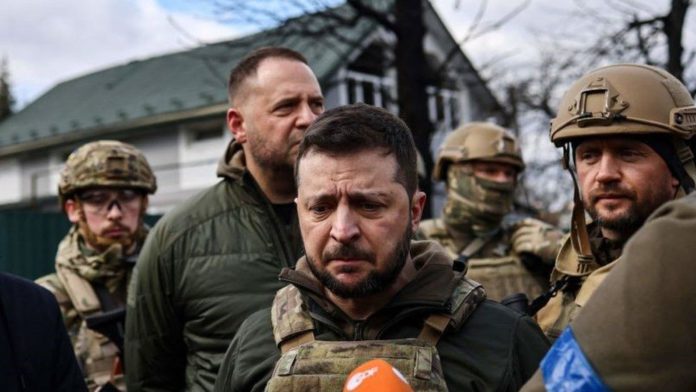
Ukraine is “alive and kicking” and will never surrender, President Volodymyr Zelensky has said, in a defiant address to US lawmakers on his first foreign trip since Russia’s invasion.
US military aid to Ukraine was not charity, but an investment in security for the future, Mr Zelensky said.
His appeal comes amid signs US support is likely to face greater scrutiny by Republican lawmakers in Congress.
But President Joe Biden vowed to stick by Ukraine “for as long as it takes”.
Mr Biden pledged a new $2bn (£1.7bn) aid package and promised another $45bn.
At a joint news conference, Mr Biden told reporters he was “not at all worried” about holding the international coalition together.
Amid concerns that some allies may be feeling the strain of the conflict’s cost and disruption to global food and energy supplies, the US president said he felt “very good” about the solidarity of support for Ukraine.
As Ukraine’s most important ally, the US has already committed $50bn (£41bn) of humanitarian, financial and security assistance – far more than any other country.
Mr Zelensky – wearing his trademark combat-green sweatshirt and boots – expressed hope that Congress would pass an extra $45bn in aid to Ukraine – currently before the US Senate – to “help us to defend our values and independence”.
Republicans – who will take control of the House of Representatives in January – have warned they will not write a “blank cheque” for Ukraine.
In fact, Republican support for continued assistance has been eroding. In a survey conducted in November, just over half of Republican voters supported aid to Ukraine – down from 80% in March.
But Mr Zelensky, who travelled on a US Air Force jet from the Polish city of Rzeszow, said that “regardless of changes in the Congress”, he believed there would be bipartisan support for his country.
And he made his plea in emotive terms before a joint session of Congress – a speech that was interrupted 18 times with standing ovations by nearly all members of Congress, with the exception of some Republican lawmakers who did not clap.
Speaking in English, he told them his country was still standing “against all odds” and predicted “a turning point” in the conflict next year.
To illustrate the brutality of the war, Mr Zelensky evoked US troops fighting the Nazis during World War Two.
“The Russians’ tactic is primitive. They burn down and destroy everything they see. They sent convicts to the front lines, to the war. They threw everything against us, similar to the other tyranny, which in the Battle of the Bulge threw everything it had against the free world.
“Just like the brave American soldiers who held their lines and fought back Hitler’s forces during the Christmas of 1944, brave Ukrainian soldiers are doing the same to [Russian President Vladimir] Putin’s forces this Christmas,” he said. “Ukraine holds its lines and will never surrender.”
Concluding his speech, Mr Zelensky presented Congress with a battle flag signed by the defenders of Bakhmut, a frontline city in the east of Ukraine that he visited on the eve of his Washington trip.
The package of security assistance announced by Washington on Wednesday includes a new Patriot missile system, which is expected to help Ukraine protect its cities from missiles and drones that Russia has fired at critical facilities.
Russia’s foreign ministry has said the delivery of the advanced surface-to-air missile system will be considered a provocative step.
Earlier on Wednesday, Mr Putin said he believed his country was not to blame for the war in Ukraine, adding both countries were “sharing a tragedy”.
His spokesman said no calls for peace had been heard during Mr Zelensky’s visit to Washington.
“This indicates that the United States continues its line of de facto and indirectly fighting with Russia to the last Ukrainian,” Dmitry Peskov said.
Since Russia invaded Ukraine on 24 February, the US military estimates that at least 100,000 Russian and 100,000 Ukrainian soldiers have been killed or injured, along with some 40,000 civilian deaths.
The UN has recorded 7.8 million people as refugees from Ukraine across Europe, including Russia. However, the figure does not include those who have been forced to flee their homes but remain in Ukraine.
